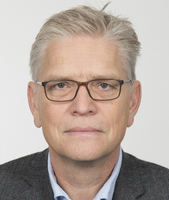Hansjörg Schild
Immunological Consequences of Age-Related Changes in Proteostasis

T cells are crucially involved in the surveillance of tissues to eliminate infected or transformed cells. This function depends on the recognition of small peptide fragments presented by HLA molecules on the surface of cells. The presentation of peptides resulting from pathogen-derived or mutated proteins triggers the activation of T cells, whereas peptides derived from self-proteins are important for the induction of T cell tolerance in the thymus.
Peptides recognised by T cells are generated by different cellular proteases, which contribute to the establishment of a balanced and functional universe of cellular proteins, the proteome. Disturbance of proteostasis can affect T cell function. Reduced or missing presentation of “foreign” peptides can result in reduced T cell activation, contributing to chronic infections or cancer. The generation of a new repertoire of peptides derived from self-proteins against which no tolerance has been induced can result in the activation of autoreactive T cells.
Therefore, we are interested in understanding the consequences of age-related changes in the generation of HLA-presented peptides with regard to T cell function. This work builds on a longstanding expertise on antigen-processing and presentation pathways and mechanisms involved in the induction of tumour- and virus-specific T cell responses.
Positions held
- Since 2023: Vice-President of the German Society for Immunology
- Since 2020: Deputy Chief Scientific Officer, University Medical Center Mainz, Germany
- Since 2018: Member of the Committee for Research Infrastructures of the German Council of Science and Humanities (Wissenschaftsrat)
- Since 2018: Speaker of the CRC 1292 on “Targeting convergent mechanisms of inefficient immunity in tumors and chronic infections”
- Since 2018: Member of the Scientific Management Board HI-TRON, Mainz, Germany
- Since 2017: Vice-Dean for Research, University Medical Center Mainz, Germany
- 2008 - 2016: Member of the DFG Review board 204 (Microbiology, Virology, Immunology)
- Since 2003: Director (C4), Institute for Immunology, University Medical Center, Johannes Gutenberg University Mainz, Germany
- 1996 - 2003: Group leader, Institute for Cell Biology, Dept. of Immunology, University of Tübingen, Germany
- 1993 - 1996: Group leader, German Cancer Research Center, Heidelberg, Germany
- 1990 - 1993: Postdoc, Stanford University Medical School, Stanford, USA
- 1990: Postdoc, Max-Planck-Institute for Biology, Tübingen, Germany
Education
- 2000: Habilitation "Immunology and Cell Biology", University of Tübingen, Germany
- 1993: Scholarship of the German Science Foundation
- 1987 - 1989: Doctoral degree in Immunology, University of Marburg and Max-Planck-Institute for Biology, Tübingen, Germany
- 1985 - 1987: Diploma, German Cancer Research Center, Heidelberg, Germany
- 1981 - 1985: Study of Human Biology, University of Marburg, Germany
Selected publications by Hansjörg Schild
Schaupp L, Muth S, Rogell L, Kofoed-Branzk M, Melchior F, Lienenklaus S, Ganal-Vonarburg SC, Klein M, Guendel F, Hain T, Schütze K, Grundmann U, Schmitt V, Dorsch M, Spanier J, Larsen PK, Schwanz T, Jäckel S, Reinhardt C, Bopp T, Danckwardt S, Mahnke K, Heinz GA, Mashreghi MF, Durek P, Kalinke U, Kretz O, Huber TB, Weiss S, Wilhelm C, Macpherson AJ, Schild H#, Diefenbach A# and Probst HC# (2020) Microbiota-induced type I interferons instruct a poised basal state of dendritic cells. Cell, 181:1080–1096 (# indicates joint correspondence) Link
Shen L, Tenzer S, Storck W, Hobernik D, Raker VK, Fischer K, Decker S, Dzionek A, Krauthäuser S, Diken M, Nikolaev A, Maxeiner J, Schuster P, Kappel C, Verschoor A, Schild H#, Grabbe S# and Bros M# (2018) Protein corona-mediated targeting of nanocarriers to B cells allows redirection of allergic immune responses. J Allergy Clin Immunol, 42:1558–1570 (# indicates joint correspondence) Link
Srokowski CC, Masri J, Hövelmeyer N, Krembel AK, Tertilt C, Strand D, Mahnke K, Massoumi R, Waisman A# and Schild H# (2009) Naturally occurring short splice variant of CYLD positively regulates dendritic cell function. Blood, 113:5891–5 (# indicates joint correspondence) Link
Osterloh P, Linkemann K, Tenzer S, Rammensee HG, Radsak MP, Busch DH and Schild H (2006) Proteasomes shape the repertoire of T cells participating in antigen-specific immune responses. Proc Natl Acad Sci USA, 103:5042–7 Link
Stoltze L, Schirle M, Schwarz G, Schröter C, Thompson MW, Hersh LB, Kalbacher H, Stevanovic S, Rammensee HG and Schild H (2000) Two new proteases in the MHC class I processing pathway. Nat Immunol, 1:413–418 Link
